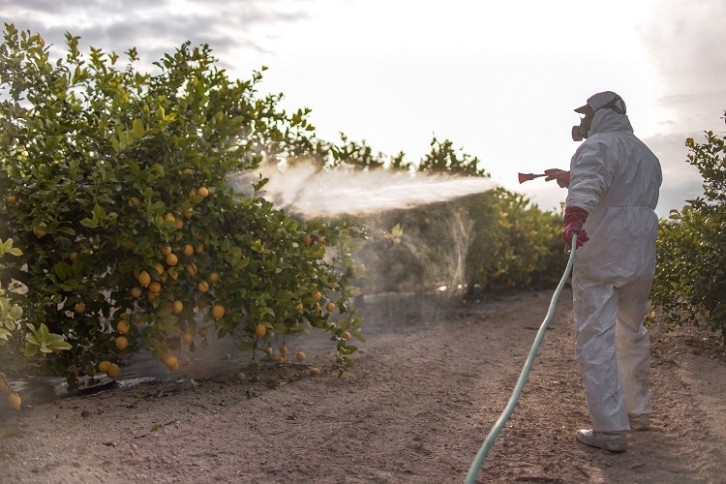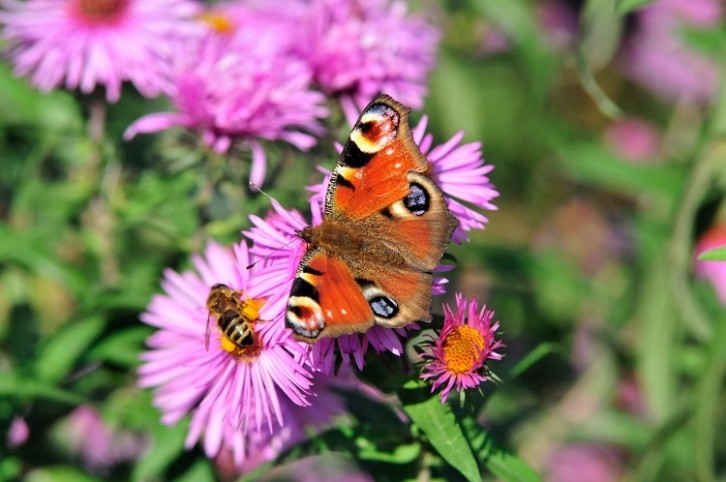Organic alternative to chemical pesticides discovered

One of the biggest objections to a reduction in pesticide use by farmers is the belief that it will result in lower crop yields. In fact, just recently, the EU abandoned a bill to reduce pesticide use by 50%, by 2030, as a direct result of fierce protests by farmers across Europe. So could an organic alternative to chemical pesticides be the solution that supports farmers and the environment?
Organic solution to chemical pesticides
Research carried out by scientists at Tokyo University of Science has found that rose essential oil stimulates defense genes in tomatoes and draws in predators of herbivores, thus protecting the plants, without the use of chemical pesticides.
What are terpenoids?
Terpenoids, also known as isoprenoids, are a class of naturally occurring organic chemicals.
Plant terpenoids are used for their aromatic qualities and play a role in traditional herbal remedies. Terpenoids contribute to the scent of eucalyptus, the flavours of cinnamon, cloves and ginger, the yellow colour in sunflowers and the red colour in tomatoes. Well-known terpenoids include citral, menthol and camphor.
Terpenoids and terpenes are the main bioactive compounds of essential oils.
Terpenoids, a class of naturally occurring organic chemicals, are abundant in plant essential oils and have received widespread attention for their ability to regulate plant defense responses by regulating the expression of defense genes.
For example, soybean and komatsuna plants, when grown near mint, experience a significant improvement in defense properties and become resistant to herbivores. This phenomenon occurs through a process known as “eavesdropping,” whereby volatile compounds are released from the mint plant. These volatile compounds trigger the activation of defense genes, protecting against potential herbivore threats.
Dangers of using chemical pesticides
Chemical pesticides are currently used by most farmers to kill pests including insects, rodents and weeds, and are seen by many as essential for the production of strong crop yields. However, as well as killing “pests”, pesticide use is also causing significant damage to the environment.
According to the European Environment Agency (EEA), “widespread pesticide use is a major source of pollution — contaminating water, soil and air, driving biodiversity loss, and leading to pest resistance.
Furthermore, the EEA has found that, “human exposure to chemical pesticides is linked to chronic illnesses such as cancer, and heart, respiratory and neurological diseases.”
Why is biodiversity loss such a serious issue?
Biodiversity is essential for food production meaning that biodiversity loss is a direct threat to food security.
The United Nations (UN) has described biodiversity as, “the web of life that we depend on for so many things – food, water, medicine, a stable climate, economic growth, among others.”
Moreover, it states that, “nature is in crisis,” with up to one million species currently under threat from extinction.
The European Parliament states that, “biodiversity, or the variety of all living things on our planet, has been declining at an alarming rate in recent years, mainly due to human activities, such as land use changes, pollution and climate change.”
Study findings
When looking to find an environmentally-friendly alternative to chemical pesticides the research team, led by Professor Gen-ichiro Arimura, decided to analyse the efficacy of essential oils. They assessed the effectiveness of 11 essential oils in activating tomato defense responses.
“Essential oils used as fragrances for various purposes contain odour components, which may have the ability to work like volatile compounds in conferring pest resistance. We aimed to investigate the effects of these essential oils on plants’ insect pest resistance,” explains Professor Arimura.
The research team found that rose essential oil increased levels of PIR1 and PIN2, the genes involved in plant defense. Additionally, tomato plants treated with rose essential oil exhibited reduced leaf damage caused by the Spodoptera litura (a moth species) larvae and Tetranychus urticae (a mite pest). They then conducted a field experiment to measure rose essential oil activity in field conditions, observing a 45.5% reduction in tomato pest damage, compared to the control solution. The researchers believe that rose essential oil could therefore serve as a viable alternative to chemical pesticides.
“Rose essential oil is rich in β-citronellol, a recognised insect repellent, which enhances rose essential oil’s efficacy,” says Professor Arimura. “Owing to this, damage caused by the moth larvae and mites was significantly minimised, confirming rose essential oil as an effective biostimulant.”
Additionally, findings also showed that a low concentration of rose essential oil did not repel Tetranychus urticae, but did attract its predator, Phytoseiulus persimilis.
“Our study suggests a practical approach to promoting organic tomato production that encourages environmentally friendly and sustainable practices. This research may open doors for new organic farming systems. The dawn of potent environmentally friendly and natural pesticides is upon us,” concludes Professor Arimura.
Moving towards more biodiversity-friendly farming practices is essential for reversing biodiversity loss, as Annemarie Botzki, agriculture campaigner for consumer watchdog Foodwatch, told FoodNavigator
“About 50% of arable land (52 million hectares) in Europe is used to grow cereals such as wheat and maize. Each cereal hectare is sprayed 4-6 times per growing season. If pesticide-free cereal production becomes the norm, these 52 million hectares could be key in reversing the decline of biodiversity and reducing health risks from farm workers, people living in rural areas and consumers. Compared to fruit and vegetable production, which happens on only a small portion of agricultural land, the impact on pesticide free grain production is huge.”
Source: Novel Potential of Rose Essential Oil as a Powerful Plant Defense Potentiator
Published online: 18 March 2024
DOI: https://pubs.acs.org/doi/10.1021/acs.jafc.3c08905
Authors: Eiki Kaneko, Kenji Matsui, Ruka Nakahara, Gen-ichiro Arimura



























